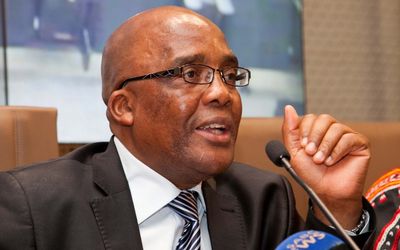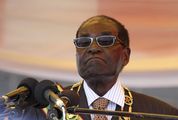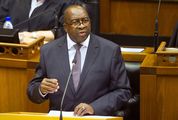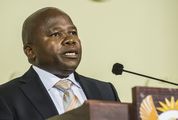HEALTH Minister Aaron Motsoaledi has published draft legislation proposing reforms to the debt-ridden National Health Laboratory Service (NHLS).
This will pave the way for the creation of a new institute responsible for monitoring and responding to outbreaks of diseases such as Ebola. The NHLS Amendment Bill and the National Public Health Institute of SA Bill were published last month.
The NHLS raises almost all of its funds from the diagnostics tests it performs for provinces, but billing disputes have left it saddled with debts. Its financial woes have strained its capacity to fulfil other responsibilities, which include training pathologists and running the National Institute for Communicable Diseases, the National Cancer Registry and the National Institute for Occupational Health.
The NHLS Amendment Bill’s most significant provisions propose strengthening the governance of the institution by changing the size and composition of its board, and giving the minister the power to institute a formal inquiry if it fails to fulfil its duties.
"Currently the minister cannot intervene to address problems or nonperformance without having to go to court," Health Department deputy director-general for regulation and compliance, Anban Pillay, said on Wednesday.
Instead of having a 22-member board with representatives from all nine provinces, the bill proposes a leaner board of between seven and 11 members.
The bill also clarified the minister’s role in appointing the CEO of the NHLS, said Dr Pillay. The Health Department was discussing a new funding model with the NHLS and provinces, he said.
"The current model is that of a fee-for-service approach. The legislation is being changed to allow greater flexibility in changing the reimbursement methods. A fee-for-service (model) has been shown to entrench perverse incentives."
Dr Pillay said the NHLS’s financial position had improved, as provinces were paying more of their bills on time.
"The NHLS has been able to steadily reduce its liability to suppliers and has maintained a two-month buffer in terms of salary costs," he said.
Dr Pillay declined to say how much it was owed. In March NHLS officials told Parliament KwaZulu-Natal owed R3.289bn and Gauteng owed R1.092bn.
The National Public Health Institute of SA Bill proposes the establishment of an institution that is loosely based on the US Centres for Disease Control and Prevention to conduct surveillance of disease and research. "The aim … is to provide integrated and co-ordinated disease and injury surveillance, research, monitoring and evaluation of services, and interventions directed towards the major public health problems affecting (people) in SA," said Dr Pillay.
"It will be funded through a direct transfer from the fiscus. It may also complement its revenue through other funding streams."
Direct funding will make it simpler for the government to provide it with extra finances to respond to disease outbreaks, such as the recent Ebola emergency in West Africa.

Aaron Motsoaledi. Picture: GCIS
HEALTH Minister Aaron Motsoaledi has published draft legislation proposing reforms to the debt-ridden National Health Laboratory Service (NHLS).
This will pave the way for the creation of a new institute responsible for monitoring and responding to outbreaks of diseases such as Ebola. The NHLS Amendment Bill and the National Public Health Institute of SA Bill were published last month.
The NHLS raises almost all of its funds from the diagnostics tests it performs for provinces, but billing disputes have left it saddled with debts. Its financial woes have strained its capacity to fulfil other responsibilities, which include training pathologists and running the National Institute for Communicable Diseases, the National Cancer Registry and the National Institute for Occupational Health.
The NHLS Amendment Bill’s most significant provisions propose strengthening the governance of the institution by changing the size and composition of its board, and giving the minister the power to institute a formal inquiry if it fails to fulfil its duties.
"Currently the minister cannot intervene to address problems or nonperformance without having to go to court," Health Department deputy director-general for regulation and compliance, Anban Pillay, said on Wednesday.
Instead of having a 22-member board with representatives from all nine provinces, the bill proposes a leaner board of between seven and 11 members.
The bill also clarified the minister’s role in appointing the CEO of the NHLS, said Dr Pillay. The Health Department was discussing a new funding model with the NHLS and provinces, he said.
"The current model is that of a fee-for-service approach. The legislation is being changed to allow greater flexibility in changing the reimbursement methods. A fee-for-service (model) has been shown to entrench perverse incentives."
Dr Pillay said the NHLS’s financial position had improved, as provinces were paying more of their bills on time.
"The NHLS has been able to steadily reduce its liability to suppliers and has maintained a two-month buffer in terms of salary costs," he said.
Dr Pillay declined to say how much it was owed. In March NHLS officials told Parliament KwaZulu-Natal owed R3.289bn and Gauteng owed R1.092bn.
The National Public Health Institute of SA Bill proposes the establishment of an institution that is loosely based on the US Centres for Disease Control and Prevention to conduct surveillance of disease and research. "The aim … is to provide integrated and co-ordinated disease and injury surveillance, research, monitoring and evaluation of services, and interventions directed towards the major public health problems affecting (people) in SA," said Dr Pillay.
"It will be funded through a direct transfer from the fiscus. It may also complement its revenue through other funding streams."
Direct funding will make it simpler for the government to provide it with extra finances to respond to disease outbreaks, such as the recent Ebola emergency in West Africa.




















Change: -1.03%
Change: -0.80%
Change: -5.02%
Change: -0.11%
Change: 2.54%
Data supplied by Profile Data
Change: -0.48%
Change: 0.47%
Change: -1.03%
Change: 0.00%
Change: 0.23%
Data supplied by Profile Data
Change: 2.01%
Change: 1.29%
Change: 1.43%
Change: 1.10%
Change: 0.91%
Data supplied by Profile Data
Change: -0.32%
Change: -0.04%
Change: -0.35%
Change: 0.54%
Change: 0.10%
Data supplied by Profile Data